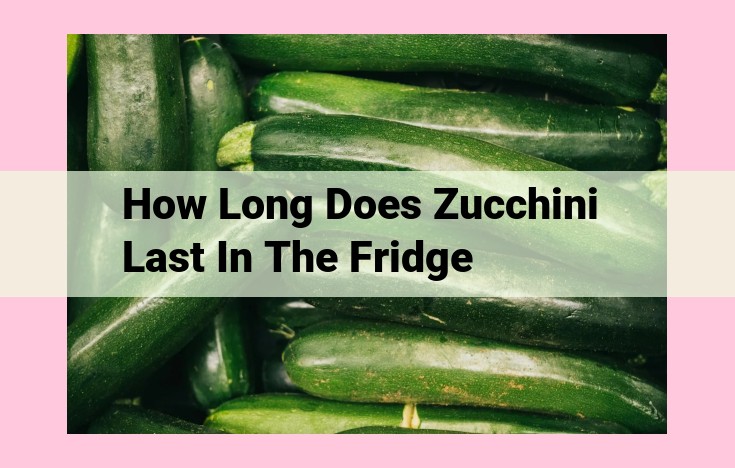Ultimate Guide To Maximizing Zucchini Shelf Life In The Refrigerator

Zucchini’s shelf life in the refrigerator is influenced by several factors: storage technique (whole vs. cut, packaging), environmental conditions (temperature, humidity, air circulation), spoilage factors (microbial growth, ethylene gas), zucchini variety, and harvest time. Proper storage techniques include refrigerating whole, unwashed zucchinis in a plastic bag. Optimal storage conditions are 39-46°F (4-8°C) with 90-95% humidity. To prevent spoilage, avoid storing near ethylene-producing fruits (apples, bananas). Whole zucchinis can last up to 2 weeks, while cut zucchinis last 3-5 days.
Factors with High Closeness Rating to Zucchini Storage (Closeness Rating 8-10)
- Introduction to the importance of understanding factors that impact zucchini storage.
- List and briefly describe key entities with a closeness rating of 8-10, including zucchini, storage techniques, temperature, humidity, etc.
Understanding the Key Factors Impacting Zucchini Storage: A Comprehensive Guide
In the world of preserving fresh produce, understanding the factors that influence storage duration is crucial. For zucchini, a versatile and nutritious vegetable, it’s essential to know the key entities that play a significant role in its longevity.
Zucchini: The Star of the Show
As the central subject of this discussion, zucchini stands out with its unique characteristics. Its ability to retain freshness depends on several factors, including variety, harvest time, and storage techniques.
Storage Techniques: A Balancing Act
The way zucchini is stored can make a world of difference. Whole zucchinis tend to last longer than cut pieces, as the intact skin acts as a protective barrier. Packaging also plays a vital role, with breathable materials allowing for proper air circulation and moisture regulation.
Environmental Factors: The Perfect Climate
Zucchini thrives in specific environmental conditions. Optimal temperature for storage ranges between 45-50°F (7-10°C), while proper humidity of 90-95% prevents wilting and dehydration. Adequate air circulation is also crucial, reducing the risk of fungal growth and allowing for proper gas exchange.
Spoilage Factors: The Silent Enemies
Several factors can contribute to zucchini spoilage, including microbial growth and ethylene gas production. Bacteria and mold thrive in warm, moist conditions, leading to decay. Ethylene gas, produced by ripe fruits and vegetables, accelerates ripening and shortens storage life.
Variety and Harvest Time: Nature’s Influence
The variety of zucchini and the time of harvest can impact its storage potential. Certain varieties are known for their extended shelf life, while optimizing harvest time ensures that zucchinis are at their peak ripeness when stored.
Factors Influencing Zucchini Storage: A Comprehensive Guide to Extending Freshness
Storage Techniques: Whole vs. Cut and Packaging Impact
Zucchini can be stored whole or cut. If you plan to store it whole, leave the stem intact as it helps prevent moisture loss. Cut zucchinis, however, have a shorter shelf life and should be consumed within a few days.
Packaging also plays a crucial role in storage. Unpackaged zucchinis will lose moisture and deteriorate faster. Consider using plastic bags or containers with holes to allow for air circulation and prevent ethylene gas accumulation.
Environmental Factors: Optimal Temperature, Humidity, and Air Circulation
The ideal temperature range for zucchini storage is between 45-50°F (7-10°C). Temperatures below this range can cause chilling injury, while higher temperatures promote spoilage.
High humidity is essential to prevent wilting and moisture loss. Keep zucchinis in a humid environment with a relative humidity of 90-95%.
Good air circulation is also crucial to remove ethylene gas, which accelerates ripening and spoilage. Store zucchinis in areas with adequate ventilation or use fans to circulate the air.
Spoilage Factors: Microbial Growth and Ethylene Gas Production
Two key factors contribute to zucchini spoilage: microbial growth and ethylene gas production.
Bacteria and fungi can cause zucchinis to rot and deteriorate. Proper storage conditions, such as low temperatures and high humidity, help inhibit microbial growth.
Ethylene gas is a natural plant hormone that promotes ripening. High levels of ethylene in the storage environment can accelerate zucchini spoilage. Storing zucchinis away from other ethylene-producing fruits, such as apples and bananas, is essential.
Variety and Harvest Time: Influence on Storage Duration
Different zucchini varieties have varying storage lifespans. Choose varieties known for their storage, such as ‘Black Beauty’ or ‘Cocozelle’.
Harvest time also affects storage duration. Zucchinis harvested when they are immature tend to have a longer shelf life than those harvested at a more mature stage.
Nutritional Considerations for Zucchini Storage
Nutritional Changes
Zucchini is a treasure trove of essential nutrients, including vitamin C and antioxidants. However, these beneficial components undergo subtle transformations during storage. Vitamin C, a potent antioxidant, gradually declines over time. Antioxidant activity may also diminish, albeit at a slower pace.
Food Safety
Safe handling practices are crucial to prevent foodborne illness. Before storage, meticulously wash zucchinis to remove surface contaminants. Proper storage techniques are equally vital. Regularly monitor zucchinis for signs of spoilage, such as soft spots, discoloration, and mold growth. If any of these symptoms appear, discard the zucchini promptly.
Key Takeaways for Optimal Zucchini Storage:
- Choose firm, unblemished zucchini for storage.
- Store at optimal temperature and humidity to extend shelf life.
- Utilize proper storage techniques like refrigeration or controlled atmosphere storage.
- Monitor zucchini regularly for signs of spoilage.
- Practice safe handling to prevent foodborne illnesses.
By following these guidelines, you can maximize the nutritional value and safety of your stored zucchinis, ensuring their freshness and health benefits for longer.